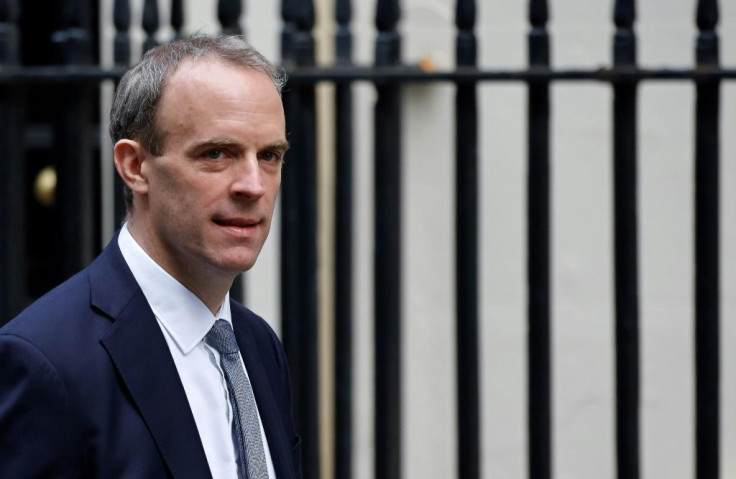FDA demands independent inquiry into bullying following Raab's resignation
The FDA union claim that the problem of ministerial bullying is bigger than Raab. However, in his resignation letter, Raab has pushed back against the investigation into his conduct.

Following the investigation into former Deputy Prime Minister Dominic Raab by Adam Tolley KC, the FDA union has called for an independent inquiry into ministerial bullying. Raab resigned on the 21st of April after Prime Minister Rishi Sunak was handed a report outlining claims that the Deputy PM had bullied civil servants in several government departments.
The news comes as the PM Rishi Sunak is being investigated by the parliament's standards watchdog in relation to his wife's shareholding in a company expected to benefit from government policy. It also comes ahead of the upcoming local elections in May, with the Conservatives already suffering in the national polls. YouGov's polls show that in March this year, 49 per cent of respondents thought that Rishi Sunak is doing badly as PM, with just 34 per cent of respondents saying he is doing well.
Raab, who has been a member of parliament since 2010, has served in multiple government positions, including as Lord Chancellor, Secretary of State for Justice, First Secretary of State, Secretary of State for Foreign, Commonwealth and Development Affairs, and as Secretary of State for Exiting the European Union.
Bullying civil servants constitute a breach of the Ministerial Code, a point made by FDA General Secretary, Dave Penman. Specifically, the code states that "harassing, bullying or other inappropriate or discriminating behaviour" is inconsistent with the expectations of ministers and is not tolerable.
The FDA is the trade union which represents managers and professionals in public service. It represents more than 22,000 members graded HEO and above, including senior civil servants and policy advisors who work in Whitehall.
Why an independent inquiry?
Penman claims that the problem is bigger than Raab, referring to FDA research which shows that in the previous year, the proportion of civil servants in over 20 government departments who have "witnessed misconduct by ministers" is one in six. Penman also refers to another FDA study which shows that the number of senior civil servants who have confidence in the system when it comes to dealing with complaints is just 70 per cent.
Therefore, referring to the conduct of Raab and the broader evidence presented by the FDA of a "wider problem", Penman calls for Prime Minister Rishi Sunak to launch an independent inquiry to further investigate ministerial bullying. Moreover, "Raab is not just one bad apple," according to Penman. Instead, in his view, the issue of ministerial bullying is wider than the PM wants to admit.
Raab's Resignation Letter
In his resignation letter, Raab explained that he felt "duty-bound" to respect the investigation outcome and resign. However, he also pushes back against the conclusions of the investigation, arguing that it sets the "threshold" for bullying inappropriately low, with "spurious complaints against ministers" likely to be encouraged as a result. Moreover, he stated that the two findings against him are "flawed".
Penman refers to the "obviously reluctant tone" of Raab's resignation letter, arguing that the "dismissal of the complaints says more about his conduct than any findings will."
In response to the findings against him, he argued that "ministers must be able to exercise direct oversight" over senior officials as they conduct "critical negotiations" in the public interest. He also emphasised the need for ministers to be able to assert "direct critical feedback on briefings and submissions to senior officials."
In his letter of response, the PM accepted Raab's resignation with "great sadness", stating that Raab could be "extremely proud" of his achievements in the government. However, Sunak also mentioned his pledge to ensure "integrity, professionalism and accountability" in government, indicating that he agreed with Raab that it was right for him to go. This could mean that if Raab had not resigned voluntarily (or refused to resign if asked to by Number 10), he might have been sacked by the PM.
Responses to the PM
In a comment on Raab's resignation, Labour leader Sir Keir Starmer stated that "it's Raab who resigns, rather than the Prime Minister who acts." He went on to express frustration that "weaknesses at the top of the Tory party" are distracting from substantive policy issues. For example, "in the future of the NHS."
Deputy Labour leader Angela Rayner also criticised the PM's response in an interview with Sky News, arguing that victims of bullying have been shown "no acknowledgement" of what has happened. She referred to the PM's letter in response to Raab as "absolutely disgusting", claiming that it failed to "acknowledge the seriousness of what's happened."
In an interview with the BBC, the leader of the Liberal Democrats Sir Ed Davey said that "this isn't the first time there has been bullying at the top of the Conservative government." He refers to the example of former Home Secretary Priti Patel, who was also found guilty of breaking the ministerial code in relation to poor treatment of civil servants back in 2020. Davey goes on to argue that the PM has "failed" to deliver on his pledge to ensure integrity, professionalism and accountability in government.
© Copyright IBTimes 2025. All rights reserved.





















